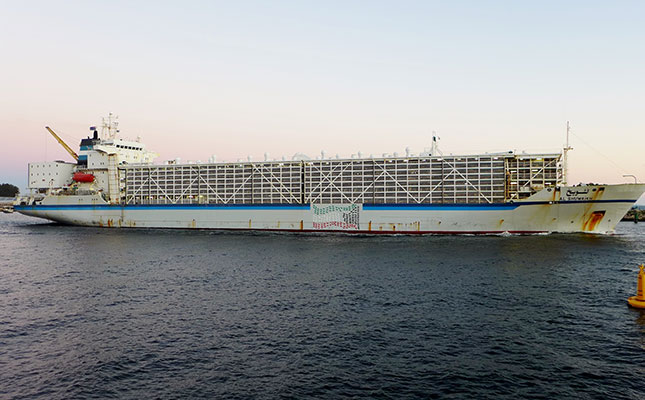
Photo: Bahnfrend
Eastern Cape and national state veterinary authorities and department of agriculture officials will not allow the planned export of approximately 61 000 live sheep to Kuwait via ship until they are satisfied all welfare requirements are met before and during the voyage.
READ Romanian live sheep exports continuing despite EU warnings
This was according to Eastern Cape Department of Rural Development and Agrarian Reform spokesperson Ayongezwa Lungisa, who told Farmer’s Weekly organisations such as the National Society for the Prevention of Cruelty to Animals (NSPCA) had been invited to tour the Al Shuwaikh livestock transport ship currently docked in East London.
The NSPCA had launched a social media campaign to garner public support aimed at having the planned live sheep export stopped.
It said the society’s inspection of the Al Shuwaikh, which was reportedly owned by Kuwait’s Al Mawashi company, which sourced livestock for halal slaughter for Kuwait’s predominantly Muslim market, “confirmed that there is cause for major welfare concerns and unavoidable contraventions of the Animal Protection Act No 71 of 1962 and World Organisation for Animal Health minimum standards.”
Lungisa said Eastern Cape and national veterinary officials had also inspected the Al Shuwaikh, and were satisfied that South Africa’s sheep for export would not suffer from the likes of extreme heat and the excessive build-up of dung and urine within the ship’s transport enclosures.
“There have been reports that livestock transported from Australia to Kuwait aboard this ship experienced high mortalities due to lack of care or poor conditions. It must be noted that the Australia to Kuwait route is much longer and that temperatures along this route are far warmer than for the South Africa to Kuwait route,” said Lungisa.
The sheep due for export from the Eastern Cape were now, according to Lungisa, being physically evaluated by state vets to ensure the animals were fit to travel and that they also met the health requirements of Kuwait’s import permit.
Any sheep not meeting these requirements would not be permitted aboard the Al Shuwaikh.
Gerhard Schutte, CEO of South Africa’s Red Meat Producers’ Organisation (RPO), said that while any international trade was good for the country’s economy, it was important that this trade was within the law.
“The RPO is already on record as stating we believe it’s much better to move meat rather than livestock for slaughtering purposes,” said Schutte.
“We know that in this case there are religious and traditional slaughter requirements. Perhaps South Africa can look at ways of meeting these slaughter requirements locally and then exporting the meat.”
Lungisa said that South Africa’s veterinary services and agriculture officials valued the NSPCA’s role in promoting animal welfare.
He urged all parties involved in the country’s livestock products exporting sector to collaborate to achieve mutually acceptable protocols and standards that would allow the sector, and South Africa’s economy as a whole, to benefit.









